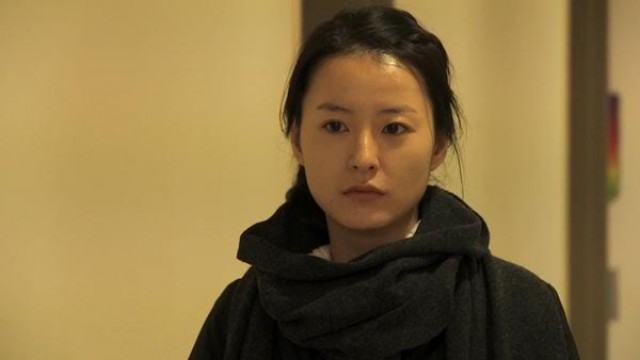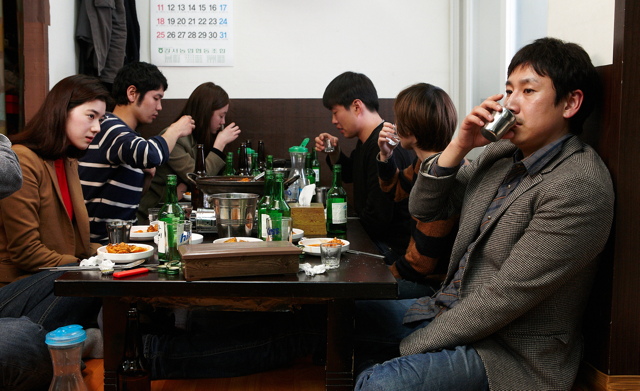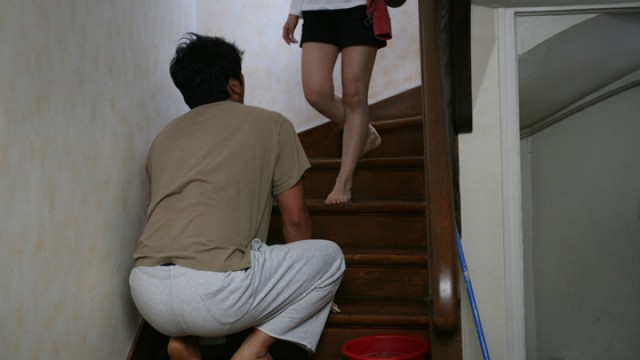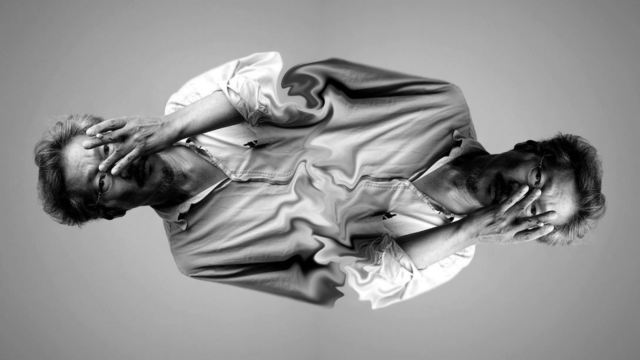
The many dualities of the films of Hong Sangsoo will be explored in two-part double feature series (photo by Sandro Baebler / image by Jasmine Abbasov)
THE HONG SANGSOO MULTIVERSE
Film at Lincoln Center, Walter Reade Theater
144 West Sixty-Fifth St. at Amsterdam Ave.
April 8-17, May 4-10 (two-for-one pricing)
www.filmlinc.org
In a July 2017 interview in Film Comment, which is published by Film at Lincoln Center, South Korean auteur Hong Sangsoo, when asked about connected themes and autobiography in his works, noted, “I’m a person who only responds to ‘what is given’ (at least in important choices), and the ‘what is given’ should be intrinsically something that I cannot know why and how it comes. . . . All my films are autobiographical in a sense that whatever I do, they all end up showing something of myself; all my films are not autobiographical in a sense that I’ve never meant to make a film that represents my life or a part of my life.”
For more than a quarter century, Hong (whose surname is sometimes spelled Sang Soo or Sang-soo) has been making fascinating films that cleverly question reality, playing with the concepts of time and space, often set in the world of film. His protagonists are writers or directors who develop different kinds of relationships with actors, fans, students, and other admirers amid a lot of drinking and smoking. His complex narratives are deeply intellectual, exploring the dual nature of life and art. When a character in one says, “I don’t think you really understood the film,” she’s talking to the audience as well, but not in a condescending way; Hong’s works are almost always satisfying on the surface, but there are myriad pleasures to uncover the more you dig.
Film at Lincoln Center is celebrating Hong’s career — and the dualities he exposes — with the two-part series “The Hong Sangsoo Multiverse: A Retrospective of Double Features,” running April 8-17 and May 4-10, consisting of pairings from his entire oeuvre, including rarely shown shorts and many works that are not available on streaming platforms. In addition, on April 8 at 6:00 in the Amphitheater, the free talk “The Hong Show with Dennis Lim” will examine Hong’s world, with Film Comment editors Clinton Krute and Devika Girish, and on May 7 at 5:00 Hong himself will be at the Walter Reade Theater for a talk with Lim, the author of the Hong monograph Tale of Cinema. Hong will also be on hand for several Q&As following screenings in the second half of the series. Oh, and there is a secret screening on May 10, the title of which will not be revealed until the film is about to start. Below are select reviews; keep watching this space for more insight into this extraordinary filmmaker who you need to discover if you haven’t already.
OKI’S MOVIE (Hong Sangsoo, 2010)
Friday, April 8, 7:30 (with In Another Country)
Friday, April 15, 6:30 (with Tale of Cinema)
Throughout his prestigious career, Korean director Hong Sangsoo has explored the nature of his craft, using the creative process of filmmaking as a setting for his relationship-driven dramas. He examines the theme again in Oki’s Movie, a beautifully told tale told in four sections built around film professor Song (Moon Sung-keun) and students Jingu (Lee Sun-kyun) and Oki (Jung Yumi). Each chapter — “A Day for Chanting,” “King of Kiss,” “After the Snowstorm,” and “Oki’s Movie” — features a different point of view with a different narrator while walking the fine line between fiction and nonfiction. As in Tale of Cinema, certain parts are films within the film, shorts made by the characters for their class. Hong keeps viewers guessing what’s real as Oki balances a possible love triangle between her, Jingu, and Song; the final segment is a poetic masterpiece that brings everything together.
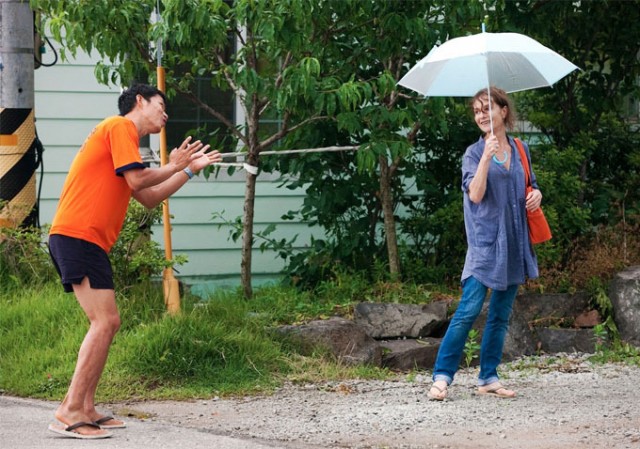
A lifeguard (Yu Jun-sang) makes the first of several offers to Anne (Isabelle Huppert) in In Another Country
IN ANOTHER COUNTRY (Hong Sangsoo, 2012)
Friday, April 8, 9:00 (with Oki’s Movie)
Saturday, April 9, 7:15 (with Our Sunhi and List)
Hong Sangsoo continues his fascinating exploration of cinematic narrative in In Another Country, although this one turns somewhat nasty and tiresome by the end. After being duped in a bad business deal by a family member, an older woman (Youn Yuh-jung) and her daughter, Wonju (Jung Yumi), move to the small seaside town of Mohjang, where the disenchanted Wonju decides to write a screenplay to deal with her frustration. Based on an actual experience she had, she writes three tales in which a French woman named Anne (each played by an English-speaking Isabelle Huppert) comes to the town for different reasons. In the first section, Anne is a prominent filmmaker invited by Korean director Jungsoo (Kwon Hye-hyo), who has a thing for her even though he is about to become a father with his very suspicious wife, Kumhee (Moon So-ri). In the second story, Anne, a woman married to a wealthy CEO, has come to Mohjang to continue her affair with a well-known director, Munsoo (Moon Sung-keun), who is careful that the two are not seen together in public. And in the final part, Anne, whose husband recently left her for a young Korean woman, has arrived in Mohjang with an older friend (Youn), seeking to rediscover herself.
In all three stories, Anne searches for a lighthouse, as if that could shine a light on her future, and meets up with a goofy lifeguard (Yu Jun-sang) who offers the possibility of sex, but each Anne reacts in different ways to his advances. Dialogue and scenes repeat, with slight adjustments made based on the different versions of Anne, investigating character, identity, and desire both in film and in real life. Hong wrote the film specifically for Huppert, who is charming and delightful in the first two sections before turning ugly in the third as Anne suddenly becomes annoying, selfish, and irritating, the plot taking hard-to-believe twists that nearly undermine what has gone on before. Hong once again weaves together an intricate plot that is soon commenting on itself and coming together in unexpected, surreal ways, but he loses his usual taut narrative thread in the final, disappointing section.
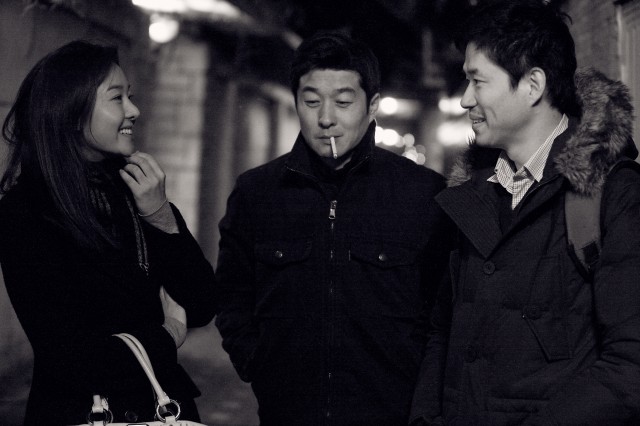
Boram (Song Sun-mi), Youngho (Kim Sang-joong), and Seongjun (Yu Jun-sang) examine their lives in fascinating ways in The Day He Arrives
THE DAY HE ARRIVES (Hong Sangsoo, 2011)
Saturday, April 9, 3:00 (with The Day After)
Monday, April 11, 6:30 (with Yourself and Yours)
For most of his career, South Korean auteur Hong Sangsoo has been making films about filmmakers, although not always about the filmmaking process itself. Often he delves into the more personal side of lead characters who are established or emerging directors. Hong reached a career peek with The Day He Arrives, a deeply intuitive, vastly intelligent, and surprisingly existential exploration of a young man at a crossroads in his life. After having made four little-seen films and deciding to become a country teacher instead, director Seongjun (Yu Jun-sang) returns to his hometown in Seoul to visit his friend Youngho (Kim Sang-joong), a film critic who has just left his wife and is hanging out with a film teacher named Boram (Song Sun-mi). Seongjun stops by to visit his old girlfriend, Kyungjin (Kim Bok-yung), keeps bumping into an actress who appeared in one of his films, goes drinking with a trio of fans, and meets Yejeon (also played by Kim Bok-yung), the owner of a local bar where Youngho and Boram take him.
As all of the main characters examine their lives, each one lacking something important, Hong has several scenes repeat multiple times with slight differences, as if they are alternate takes imbued with new meaning as the audience continues to learn more about the protagonists. Each revised scene contributes more insight and develops the characters further, even if the story seems to have backtracked in time. The nonlinear narrative and beautiful black-and-white cinematography evoke aspects of Woody Allen’s Stardust Memories, Harold Ramis’s Groundhog Day, and François Truffaut’s Day for Night, exceptional films that, like The Day He Arrives, carefully balance fantasy and reality, fiction and nonfiction while depicting the inherent dual nature of cinema and humanity. Earlier in his career, Hong seemed to have trouble ending his films, which would linger on well past the two-hour mark, but with the outstanding, poetic Oki’s Movie and its follow-up, The Day He Arrives, both of which run approximately eighty minutes, he has found an excellent length for his work — one that now almost feels too short, as he clearly has so much to say.
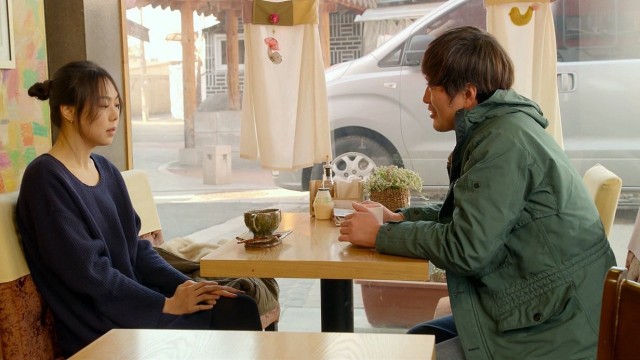
Yoon Heejung (Kim Minhee) and Ham Chunsu (Jung Jaeyoung) get to know each other twice in Right Now, Wrong Then
RIGHT NOW, WRONG THEN (Hong Sangsoo, 2015)
Sunday, April 10, 3:00 (with The Power of Kangwon Province)
Wednesday, April 13, 3:15 (with Virgin Stripped Bare by Her Bachelors)
It’s déjà vu all over again in another of Hong Sangsoo’s masterpieces, Right Now, Wrong Then. Hong’s previous films explored the nature of cinematic storytelling: often, a film director is the protagonist, and scenes and characters repeat from different points of view. In Right Now, Wrong Then, Hong again plays with the temporal aspects of narrative; he essentially starts the film over at the halfway point, switching around the words of the title and repeating opening credits. Jung Jaeyoung won several Best Actor awards for his portrayal of art-house director Ham Chunsu, who has accidentally arrived a day early to the Korean province of Suwon, where he will take part in a Q&A following a screening of one of his films. Wandering around the town, he enters the blessing hall of an old palace and meets Yoon Heejung (Kim Minhee), a shy, aspiring painter. They talk about their lives, their hopes and dreams, as they go out for coffee and tea, eat sushi and drink soju, and meet up with some friends of Heejung’s. And then they do it again, primarily scene by scene, with variations in dialogue and temperament that offer sly twists on what happened in the first half. It’s as if Chunsu and Heejung are given the kind of second chance that one doesn’t get in real life, only in movies, or maybe Hong is showing us an alternate universe where myriad possibilities exist.
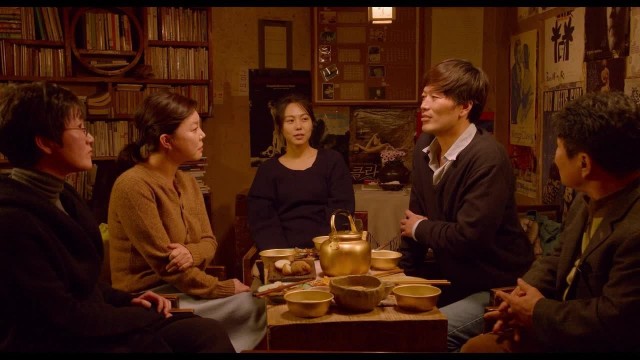
Art-house director Ham Chunsu (Jung Jaeyoung) doesn’t mind being the center of attention in award-winning Right Now, Wrong Then
Winner of the Golden Leopard for Best Film at Locarno, Right Now, Wrong Then moves at the patient, naturalistic pace and rhythm of real life, with numerous long scenes lasting between five and ten minutes with no cuts. Cinematographer Park Hongyeol, who has photographed six other Hong films, occasionally zooms in on a character, a tree, or other objects, the movement of the camera often slightly awkward, reminding us that we are watching a movie. However, the camera placement and movement, which are decided by Hong, is not what we’re used to in conventional cinema; Park and Hong eschew standard speaker-reaction back-and-forth shots, instead allowing the camera to linger in the same spot for a while, or focus in on the person not talking, or concentrate on a minute detail that appears insignificant. Adding to the film’s vitality, Hong writes each scene the same day that it’s shot, resulting in a freshness that is intoxicating. Jung (Our Sunhi, Moss) is a marvel as Chunsu, a quirky, jittery figure who is not quite as cool or humble as he might think he is, while former model Kim (Hellcats, Very Ordinary Couple) is sweetly engaging as the tentative Heejung, who is trying to find her place in the world. Meanwhile, popping up every once in a while is Jeong Yongjin’s playful, carnivalesque music, as if we’re watching life’s endless circus, which, of course, we are.
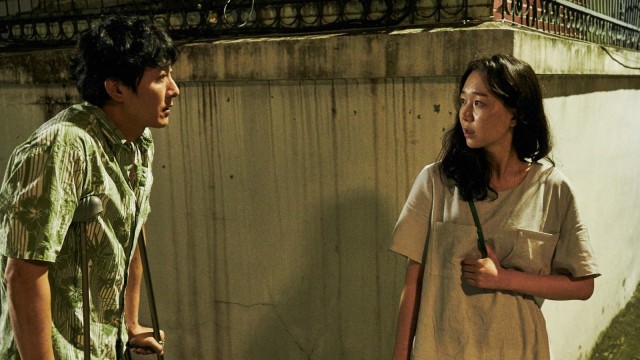
Young-soo (Kim Joo-hyuk) tries to win back Min-jung (Lee Yoo-young) in Yourself and Yours
YOURSELF AND YOURS (Hong Sangsoo, 2016)
Monday, April 11 at 8:00 (with The Day He Arrives)
Monday, May 9, 4:15 (with On the Occasion of Remembering the Turning Gate)
“Don’t try to know everything,” Min-jung (Lee Yoo-young) says in Hong Sangsoo’s latest unusual and brilliant romantic drama, Yourself and Yours. It’s impossible to know everything that happens in Hong’s films, which set fiction against reality, laying bare cinematic narrative techniques. With a propensity to use protagonists who are directors, it is often difficult to tell what is happening in the film vs. the film-within-the-film. He also repeats scenes with slight differences, calling into question the storytelling nature of cinema as well as real life, in which there are no do-overs. In the marvelous Yourself and Yours, scenes don’t repeat, although the existence of a main character might. Min-jung is in a relationship with painter Young-soo (Kim Joo-hyuk), who is dealing with the failing health of his mother when he is told by a friend (Kim Eui-sung) that Min-jung was seen in a bar drunk and arguing with another man. Young-soo refuses to believe it, since he and Min-jung are facing her drinking problem by very carefully limiting the number of drinks she has when she goes out with him. But when the friend insists that numerous people have seen her in bars with other men and imbibing heavily, Young-soo confronts her, and she virulently defends herself, claiming that they are lies and that he should have more faith in her. She leaves him, and over the next several days she has encounters with various men, but she appears to be either a pathological liar or have a memory problem as she tells the older Jaeyoung (Kwon Hae-hyo), a friend of Min-jung’s, that she is a twin who does not know the painter; later, with filmmaker Sangwon (Yu Jun-sang), she maintains that they have never met despite his assertion that they have. Through it all, Young-soo is determined to win her back. “I want to love each day with my loved one, and then die,” he explains with romantic fervor. He also acknowledges Min-jung’s uniqueness: “Her mind itself is extraordinary,” he says.
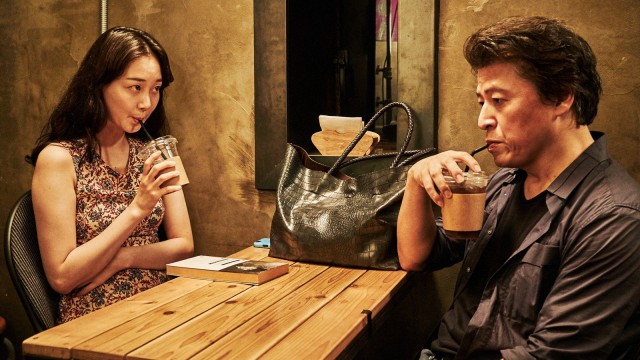
Min-jung (Lee Yoo-young) tells Jaeyoung (Kwon Hae-hyo) she has a twin in Yourself and Yours
Yourself and Yours is an intelligent and witty exploration of fear and trust, built around a beautiful young woman who might or might not be lying, as she seems to reboot every time she meets a man, erasing her recent past. Lee (Late Spring, The Treacherous) is outstanding as Min-jung, keeping the audience on edge as to just what might be going through her “extraordinary” mind. Kim (Lovers in Prague, My Wife Got Married) plays Young-soo with just the right amount of worry and trepidation. As with most Hong films, there is a natural flow to the narrative, with long shots of characters just sitting around talking, smoking, and drinking — albeit primarily beer in this case rather than soju — with minimal camera movement courtesy of regular Hong cinematographer Park Hong-yeol (Hahaha, Our Sunhi), save for Hong’s trademark awkward zooms. There’s also an overtly cute romantic comedy score by Dalpalan to keep things light amid all the seriousness. Hong continually works on his scripts, so the actors generally get their lines the day of the shoot, adding to the normal, everyday feel of the performances. Many writers have compared the film to Luis Buñuel’s grand finale, 1977’s That Obscure Object of Desire, in which Carole Bouquet and Angelina Molina alternate playing a flamenco dancer, postulating that there are numerous Min-jungs wandering around town, a series of doppelgängers hanging out in bars. That’s not the way I saw it at all (and at the San Sebastian Film Festival, Hong denied it was a direct influence); instead, I see it as one Min-jung, dealing with the endless aspects of relationships, and one Young-soo, an artist who desperately wants to believe in true love and who does not want to be alone, particularly with his mother on her deathbed. There’s the smallest of cues near the end that explains it all, but I’m not about to give that away. And I’m not sure how much it even matters, as regardless of how many Min-jungs might populate this fictional world, Hong has crafted another mesmerizing and mysterious look at love and romance as only he can.
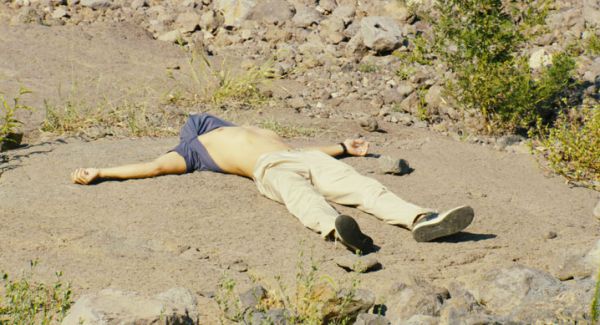
Kim Tae-woo is outstanding as annoying, self-obsessed auteur in Like You Know It All
LIKE YOU KNOW IT ALL (Hong Sangsoo, 2009)
Tuesday, April 12, 8:45 (with Virgin Stripped Bare by Her Bachelors)
Thursday, April 14, 6:30 (with On the Beach at Night Alone)
Hong Sangsoo’s Like You Know It All is another intriguing examination of art and sex in contemporary society from the South Korean auteur. Hong, who has served as a juror at several film festivals and whose work has screened at fests all over the world, sets his latest self-reflexive story at the real Jecheon International Music and Film Festival, where director Ku will be part of the jury. But it turns out that Ku is a self-absorbed, insensitive, and subtly obnoxious filmmaker who cares only about himself, walking away from fans and colleagues in the middle of a conversation or in the midst of signing an autograph, interested only in listening to people praise his own talent, which has been relegated to art-house films that few people see and even fewer understand.
After leaving the festival to teach a class at a school on Jeju Island, he visits with a famous painter and former mentor who has unknowingly married Ku’s first love, setting the stage for the creepy Ku to perform yet more selfish acts. Kim Tae-woo is outstanding in the lead role, playing the self-obsessed director with an unerring casualness that makes him more absurdly ridiculous than conniving and mean-spirited. With a little bit of Federico Fellini’s 8 1/2 here and a touch of Woody Allen’s Stardust Memories there, Hong once again reveals the soft underbelly of ego within the film industry, but he also needs to edit himself more, as the bittersweet, slyly ironic Like You Know It All, made for a mere $100,000, is yet another of his films to clock in at more than two hours (though it feels longer).
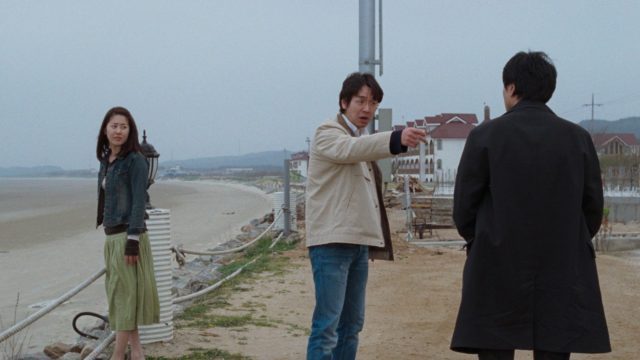
Woman on the Beach in another beautifully shot though overly long drama about art and love from Hong Sangsoo
WOMAN ON THE BEACH (Hong Sangsoo, 2006)
Saturday, April 16, 1:00 (with Nobody’s Daughter Haewon)
Sunday, April 17, 7:45 (with Woman Is the Future of Man)
In another film set in the world of cinema, Hong Sangsoo’s Woman on the Beach centers on director Joong-rae (Kim Seung-woo), who is having trouble with the script for his next project, so he gets production designer Chang-wook (Ki Tae-woo) to drive him out to Shinduri Beach for some quiet relaxation, away from the hustle and bustle of Seoul. Chang-wook brings along his girlfriend, Moon-sook (Ko Hyun-joung), an aspiring composer and singer who is immediately attracted to Joong-rae. As Chang-wook’s jealousy grows and Moon-sook and Joong-rae wonder if they have a future together, the director meets Sun-hee (Song Sun-mi), a soon-to-be divorcée who also has eyes for Joong-rae. Writer-director Hong Sang-soo’s moving romantic comedy features beautiful locations shot by Kim Hyung-koo, a sweet score by Jeong Yong-jin, and unusual but believable characters. At 127 minutes, the film, which was selected for the 2006 New York Film Festival, is far too long, not quite knowing how to end, but stick with it nonetheless.
NOBODY’S DAUGHTER HAEWON (Hong Sangsoo, 2013)
Saturday, April 16, 3:30 (with Woman on the Beach)
Friday, May 6, 3:45 (with In Front of Your Face)
In South Korean director Hong Sangsoo’s bittersweet tale Nobody’s Daughter Haewon, nearly everyone who meets college student Haewon (Jeong Eun-chae) tells her that she’s “pretty,” from her mother (Kim Ja-ok), who has decided to pack up and move to Canada, to legendary star Jane Birkin (playing herself), whom she bumps into on the street, to a hot bookstore owner, to fellow students and teachers. Rather stuck up and direct on the outside but much more tender and lost on the inside, Haewon reaches out to a former lover, film professor Seongjun (Lee Sun-kyun), who is married with a baby. As they contemplate rekindling their affair, they wind up getting drunk on sake with a group of Seongjun’s students, who suspect the teacher-student romance and clearly do not like Haewon. Meanwhile, Haewon, who is reading Norbert Elias’s The Loneliness of the Dying, is intrigued by the flirtations of another film professor, Jungwon (Kim Eui-sung), who teaches in San Diego. From Seoul’s West Village to the historic Fort Namhan, Haewon tries to find her place in the world as writer-director Hong employs a chronological narrative that combines her dreams with reality over the course of a few weeks in springtime. Hong has explored similar terrain in previous films, but there’s just enough of an edge to Nobody’s Daughter Haewon to prevent it from feeling repetitive and more of the same. As always, Hong favors long establishing shots and a stationary camera that suddenly and awkwardly zooms in, instantly reminding viewers that they are watching a film. However, the scene in the restaurant goes on for several minutes with no cuts or camera movements, letting the acting and the dialogue tell the story without cinematic interference. Nobody’s Daughter Haewon also clocks in at a mere hour and a half, much shorter than most of his earlier work, which tends to go on way too long, but this one feels a little lighter in substance as well.
NIGHT AND DAY (Hong Sangsoo, 2008)
Saturday, May 7, 6:30 (with On the Beach at Night Alone)
Sunday, May 8, 8:00 (with Claire’s Camera)
Hong Sangsoo returned to the New York Film Festival for the fifth time with Night and Day, a character-driven tale about displacement and loneliness. Kim Young-ho stars as Sungam, a married painter in his forties who flees South Korea for France after having been turned in for smoking marijuana with U.S. tourists. A fish out of water in Paris, he settles into a Korean neighborhood, spending most of his time with two young art students, Yujeong (Park Eun-hye) and Hyunju (Seo Min-jeong). He also meets an old girlfriend, Minsun (Kim You-jin), who is still attracted to him. And every night he calls his wife, Sungin (Hwang Su-jung), wondering when he’ll be able to return home. Hong tells the story in a diary-like manner, with interstitials acting like calendar pages. Sometimes a day can be filled with talk of art, a party, and a chance encounter, while others can consist of a brief, random event with no real bearing on the plot, reminiscent of Jim Jarmusch’s Stranger Than Paradise, just without the existential cynicism and dark humor. As with 2006’s Woman on the Beach, Hong lets Night and Day go on too long (it clocks in at 141 minutes), with too many inconsequential (even if entertaining) vignettes, but it’s so much fun watching Kim’s compelling performance that you just might not care about the length.
